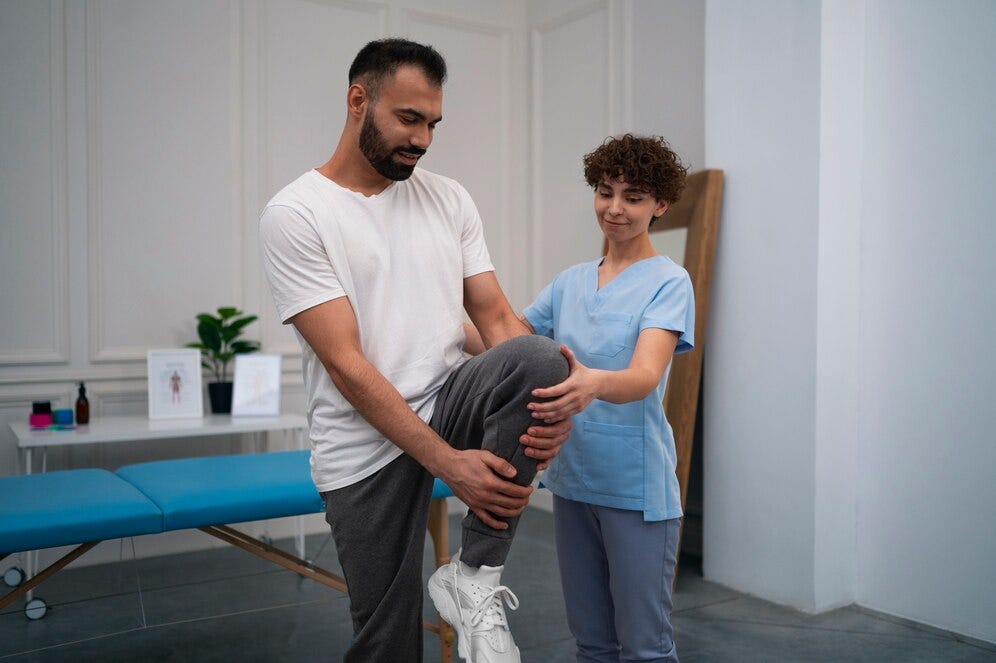Managing Pain Without Medication: Therapy Techniques That Work
Manage pain effectively without medication using proven therapy techniques like physical therapy, mindfulness, acupuncture, and more for long-term relief.
Dealing with chronic or acute pain can be challenging. Often, people seek relief through medication, but what if there were effective therapy techniques that didn't require pills? Managing pain without medication is possible, and several approaches have proven successful in reducing discomfort and improving quality of life. Let’s learn about some of these therapeutic options.
1. Physical Therapy: Movement as Medicine
Physical therapy is one of the most effective ways to manage pain. Therapists design tailored exercise routines to strengthen muscles, improve flexibility, and increase overall mobility. Specific movements can target painful areas, relieve discomfort, and prevent further injuries. It’s a proactive method that focuses on long-term relief rather than temporary fixes.
2. Cognitive Behavioral Therapy (CBT) for Pain
The mind plays a significant role in how pain is perceived. Cognitive Behavioral Therapy helps individuals manage pain by changing the way they think and react to discomfort. By identifying negative thought patterns and replacing them with healthier coping strategies, CBT can reduce the emotional distress associated with pain.
3. Acupuncture: Ancient Techniques for Modern Relief
Acupuncture, an ancient Chinese practice, involves inserting thin needles into specific points on the body. It may sound intimidating, but many have experienced significant pain relief through this method. Acupuncture is thought to stimulate nerves and muscles, enhancing blood flow and releasing the body’s natural painkillers.
4. Heat and Cold Therapy
Simple yet effective, heat and cold therapy can be used to manage different types of pain. Cold therapy, such as ice packs, is excellent for reducing inflammation and numbing sharp pain. Heat therapy, like warm baths or heating pads, helps to soothe stiff muscles and improve blood flow. Knowing when to use each technique can make a big difference in pain management.
5. Massage Therapy: Relaxation and Pain Relief
Massage therapy isn't just about pampering. It’s a powerful tool for pain management. By manipulating muscles and tissues, massage can reduce tension, improve circulation, and alleviate pain. It’s especially beneficial for conditions like lower back pain, neck pain, or muscle spasms.
6. Occupational Therapy: Adapting Everyday Activities
For those whose pain affects daily life, occupational therapy provides solutions. Occupational therapists teach techniques to perform everyday tasks more comfortably and may suggest assistive devices. The goal is to maintain independence and reduce pain triggers in regular activities.
7. Mindfulness and Meditation
Mindfulness and meditation techniques focus on staying present and accepting pain without judgment. Deep breathing exercises, guided meditation, and progressive muscle relaxation can help ease both mental and physical stress. These techniques have been shown to lower pain levels by calming the nervous system.
8. Chiropractic Care: Aligning the Body
Chiropractic adjustments can offer pain relief for conditions related to the spine, such as back pain and headaches. By realigning the spine, chiropractic care may reduce pressure on nerves and improve overall body function. It’s a non-invasive way to address pain and restore balance.
9. TENS Therapy (Transcutaneous Electrical Nerve Stimulation)
TENS therapy uses low-voltage electrical currents to relieve pain. Small electrodes are placed on the skin near the painful area, and the electrical impulses work to disrupt pain signals traveling to the brain. It’s a safe and non-addictive option for pain relief, often used in physical therapy settings.
10. Yoga and Stretching: Gentle Movement for Relief
Yoga combines physical movement, breathing, and meditation, making it a holistic approach to pain management. Gentle stretches and poses can improve flexibility, strengthen muscles, and promote relaxation. Even a few minutes of yoga a day can make a difference in managing chronic pain.
11. Biofeedback: Control Your Body's Response
Biofeedback is a technique that teaches how to control physiological functions, such as heart rate and muscle tension, to reduce pain. Sensors are placed on the body, and the individual learns to adjust their response using relaxation and breathing exercises. Over time, it can lead to better pain control without medication.
12. Nutrition and Anti-Inflammatory Diets
What we eat can influence how our body experiences pain. An anti-inflammatory diet, rich in fruits, vegetables, whole grains, and omega-3 fatty acids, can reduce chronic pain caused by inflammation. Staying hydrated and avoiding processed foods can also support overall health and pain management.
13. Art and Music Therapy: Distract and Heal
Creative therapies like art and music can be surprisingly effective in managing pain. They provide a mental distraction, reduce stress, and offer emotional release. Engaging in creative activities may not eliminate pain but can make it more manageable.
Why Non-Medication Techniques Matter
Relying solely on medication for pain management can lead to dependency and side effects. Non-medication therapies not only provide relief but also empower individuals to manage pain through lifestyle changes. These techniques focus on long-term well-being and are often used in comprehensive pain management plans.
How to Choose the Right Therapy
Selecting the right therapy depends on the type and severity of pain. It’s essential to consult with professionals at a pain management hospital in Kolkata who can create a personalized treatment plan. Sometimes, a combination of therapies is most effective. Consistency and patience are key, as some methods may take time to show results.
Introducing MRC: Your Pain Management Partner in Kolkata
When it comes to advanced pain relief, MRC is known as the best pain clinic in Kolkata. As a leading pain management hospital in Kolkata, MRC provides a range of therapies tailored to individual needs. The clinic’s experienced team focuses on holistic approaches to minimize pain and improve patients' quality of life. For comprehensive care and non-medication solutions, MRC is a top choice among pain management clinics in Kolkata.


